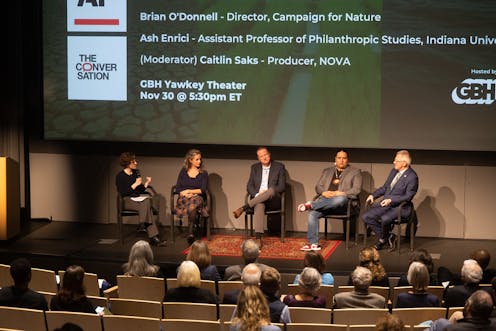Wealthy individuals are giving billions to solve the climate crisis – is it working?
- Written by Beth Daley, Executive Editor and General Manager

One of the best parts about being The Conversation is when we actually have a conversation in real life. And finally, we did just that recently with a fascinating event, co-sponsored by The Chronicle of Philanthropy, The Associated Press and GBH. Here is a recap from the Chronicle of Philanthropy[1].
Watch the full event, “How Philanthropy Can Help Fight the Climate Crisis: a Live Debate.”By Sara Herschander, Chronicle of Philanthropy
Major philanthropists have poured billions into fighting the climate crisis in recent years amid a growing sense of urgency. Their investments have sparked broader questions over philanthropy’s approach to confronting the crisis, which activists say will require trillions of dollars yearly to solve.
“There’s a difference between charity and change,” says Nick Tilsen, CEO of the NDN Collective, which aims to build Indigenous power through grant making and organizing. Tilsen would like to see more philanthropists invest in structural change and Indigenous environmental activism and stewardship.
Tilsen spoke alongside Andrew Steer, CEO of the Bezos Earth Fund[2]; Brian O’Donnell, director of the Campaign for Nature[3]; and Ash Enrici[4], assistant professor of philanthropic studies at Indiana University in a panel moderated by Caitlin Saks, a producer for PBS’ “Nova.” The event was sponsored by the Chronicle of Philanthropy[5], The Associated Press and the Conversation as part of a partnership financed by the Lilly Endowment.
Read on for key highlights.
Take the lead from grassroots groups
It’s important that philanthropists take their cues from grassroots organizers and Indigenous people, who are on the front lines of the climate movement, says O’Donnell, whose Campaign for Nature aims to secure protections for 30% of the planet by 2030.
“We’ve done a lot of studying. We’ve done a lot of analysis. We have a lot of white papers,” O’Donnell said. “The time right now is for people who are making change — grassroots leaders who are holding governments, corporations and others accountable.”
Philanthropists have only recently begun to recognize the vital role that Native people play in protecting the planet, O’Donnell said. While Indigenous people make up only around 6% of the world’s population, they protect roughly 80% of its biodiversity. Yet only a small fraction of philanthropic dollars goes toward Indigenous groups, he said.
“If you invest in the self-determination of Indigenous people, who are defending, developing and decolonizing, it’s contributing to addressing climate change and addressing racial inequality,” Tilsen said.
While an increasing number of government programs, like the Biden administration’s Justice40 Initiative, aim to support investments in people who have long been marginalized, nonprofits with leaders of color and those headed by Indigenous people often lack the capacity they need to attract funding, says Tilsen. That’s where philanthropy comes in, he added.
“Philanthropy can change their positionality,” says Tilsen, who noted that groups need investments to build capacity and attract broader funding for creating climate solutions.
Role of philanthropy
Philanthropy has the potential to catalyze innovation and spur broader reinvestment, says Steer, whose fund has pledged to disburse US$10 billion to climate causes in the next decade. The Bezos Earth Fund has been focusing on a set of 50 large-scale climate-solution grant-making decisions.
While the fund doesn’t purport to fully fund such far-reaching transitions into technologies like solar power, it aims to provide the start-up needed for broader government or corporate investments, Steer said.
“Each of those is on a path that will eventually cross into a positive tipping point. The problem is whether that tipping point will come soon enough,” says Steer, who called the climate crisis a “battle for our lives.”
Philanthropy is also able to be more nimble in its grant making than government funding, which is typically very specific in its aims and requirements, Ernici said. That’s a big advantage when it comes to combating climate change, whose effects can be unpredictable and often force organizers to shift priorities unexpectedly.
“The environment doesn’t work in a linear fashion,” says Enrici, who is currently working on a multiyear study on environmental philanthropy. “A very inflexible grant or an inflexible way of funding is not necessarily the way we’re going to be able to effect environmental change.”
Long-term change
To that end, philanthropy aimed at addressing climate change ought to recognize the role it plays in a much longer and broader effort, Enrici said.
“Things happen with the environment on a very long-term scale,” she said. “You can’t make change happen in a one-year grant cycle or even a three-year grant cycle.”
It’s a philosophy that Steer emphasizes at the Bezos Earth Fund. Even the fund’s vast financial resources cannot alone fund the deep changes needed to combat climate change, he said. Instead, he wants the fund to support organizing around longer-term change.
“We shouldn’t think of it as cost,” Steer said. “It’s an investment in the future.”
The Chronicle of Philanthropy gave its permission for The Conversation to run its story.
References
- ^ Chronicle of Philanthropy (www.philanthropy.com)
- ^ Andrew Steer, CEO of the Bezos Earth Fund (www.bezosearthfund.org)
- ^ Brian O’Donnell, director of the Campaign for Nature (naturebeyond2020.com)
- ^ Ash Enrici (philanthropy.iupui.edu)
- ^ Chronicle of Philanthropy (www.philanthropy.com)
- ^ CC BY-ND (creativecommons.org)
Authors: Beth Daley, Executive Editor and General Manager

